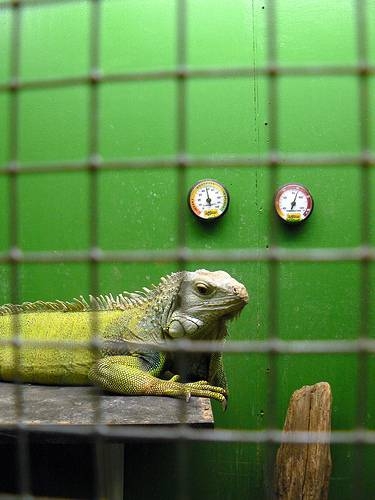Iguanas are usually seen in smaller sizes. But contrary to this, iguanas can be so large that you will need a whole room for it to be able to survive. This article will discuss on how to properly get or build a cage for you giant Iguana.
One of the most important things in building your pet’s cage is the SIZE – size does matter when it comes to your giant iguana’s cage.

There are common beliefs that an iguana’s growth size is only limited by the shape and size of their cage. But sad to say this statement is not true. Most iguanas continually grow faster on the first quarter of their life span and slower on the next half.
So before purchasing a giant iguana, make sure that you have the proper resources and space for a big cage for your iguana’s habitat. A newly hatched iguana can easily fill out a 60 gallon aquarium in just one year if properly and healthily taken care off.
A small iguana in the first 6 months of his life does not need a big cage. A large fish aquarium will do, but you should be ready to spend more after eight months because this is the time where rapid growth of your iguana occurs.
Another important thing to consider in building a cage for your giant iguana is the temperature and humidity of the cage. Iguanas are reptile and are cold blooded creature so they basically need an environment which is warm but not too hot.
A basking point should be installed which should have a temperature of eighty-nine to ninety-five degrees Fahrenheit and the total air temperature should be at least eighty degrees Fahrenheit.
Different temperature should be assigned on different parts of the cage to allow regulation of body temperature for your giant iguana pet.
You can use mercury vapor lamps or fluorescent tubes in this kind of situation though some pet shops may recommend the use of hot rocks. But veterinarians are definitely against this idea. Hot rocks can burn your giant iguana’s skin and can cause wound which would lead to infection and death.
The humidity of the cage should also be taken into consideration. A sixty-five to seventy humidity rate should be observed for a proper iguana cage. You can have this by installing a humidifier into the cage or if you find too expensive you can just manually spray water on the cage a few times everyday.
You can also try to put a large bowl of water on the cage so that it can add up to the humidity inside the cage.
Lighting is also essential so make sure that your cage has the proper lighting in order for your giant iguana to survive.
An iguana needs a good dose of UVA and UVB lights. This is because UVA lights kindle their natural behavior and UVB on the other hand helps them in producing Vitamin D3 which is an essential component of their digestion process.
The most cheap and accessible way to get this UV rays into your giant iguana’s body is by exposing them to sun rays regularly or by building their cage near a window where sunlight is abundant.
It might be quite hard for you to be able to build such a complex man made biodiversity on your own place but these are essential needs for you giant iguana to survive under your captivity.
So this is a matter of life and death, if you think that you cannot provide the listed requirement for your iguana then you should think twice and lay out your terms and reconsider your option about owning a giant iguana.
To learn about green iguanas and giant iguana, visit the Iguana Care website.
